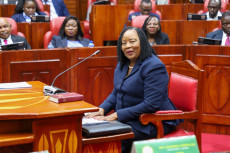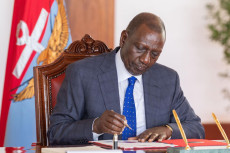- The Baringo Senate by-election, then, is more than a local contest. It is the opening chapter in a high-stakes struggle over the future of Rift Valley politics and by extension, the political survival of President William Ruto himself.
The just-concluded United Democratic Alliance (UDA) senatorial primaries in Baringo County have laid bare simmering divisions within President William Ruto’s ruling party.
While Vincent Kiprono Chemitei clinched the nomination, his victory rallies were marked by sharp rhetoric from MPs William Kamket (Tiaty) and Reuben Kiborek (Mogotio), who accused fellow legislators of “going missing in action—waliingia nyasi” during the campaign. They vowed to politically isolate such leaders ahead of the 2027 elections.
This public show of disunity has opened the door for opposition forces to exploit. As late as Monday afternoon (September 22, 2025), runner-up Wycliffe Kipsang Tobole—who reportedly met MP Kiborek at a Nakuru hotel—released a statement questioning the integrity of the party’s electronic voting system. He claimed the results did not reflect the will of the people. His next political move remains uncertain.
With Kenya African National Union (KANU) chairman and former senator Gideon Moi expected to enter the November 27 by-election, the race is shaping up to be a litmus test—not just for Baringo, but for the strength of Ruto’s political machinery in his Rift Valley stronghold.
A Moi comeback would carry symbolic weight. “KANU beats Ruto in Baringo” could become the headline—a potential mock referendum on Ruto’s presidency amid growing “one-term” narratives ahead of 2027. Such an outcome would embolden opposition leaders nationwide, creating a broader platform to challenge UDA’s dominance.
Read More
In this context, UDA may feel pressured to secure a Chemitei victory at all costs. But that path risks noisy, divisive campaigns that could dent the credibility of the newly reconstituted Independent Electoral and Boundaries Commission (IEBC), now facing its first major test. If IEBC’s impartiality is questioned, its ability to deliver a free and fair general election in 2027 could be seriously undermined.
President Ruto now faces a political Catch-22. Does he allow perceived regional kingpins—Interior CS Kipchumba Murkomen and Senate Majority Leader Aaron Cheruiyot—to wrestle for control of Baringo in the name of 2032 succession politics? Or does he stamp his authority by reigning in youthful MPs before their rivalries fracture the Rift Valley voting bloc?
History teaches that self-preservation is the strongest instinct of any political leader. For Ruto, one pragmatic option looms: striking a deal with Gideon Moi. Though diminished, Moi’s KANU still boasts a deep network of veteran politicians, MPs, and MCAs across Rift Valley and beyond. By co-opting Moi, Ruto could neutralize kingpin politics and consolidate his home base ahead of the tougher national battles of 2027.
As Bishop Emeritus Jackson Kosgei warned in October 2023, succession politics are a double-edged sword. They weaken regimes internally, embolden the opposition, and in extreme cases, expose emerging leaders to fatal risks—the tragic fates of Tom Mboya and JM Kariuki during Kenyatta’s era stand as cautionary tales.
The Baringo Senate by-election, then, is more than a local contest. It is the opening chapter in a high-stakes struggle over the future of Rift Valley politics—and by extension, the political survival of President William Ruto himself.
Stay connected with us on WhatsApp and X for instant updates and breaking news as it happens.










